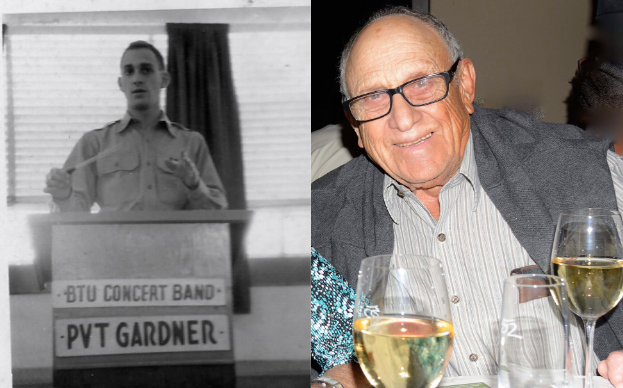On Veterans Day and throughout the month of November, AFSA will proudly spotlight a few of the men and women who generously served our country in the military and our children in America’s public schools. Please join us in celebrating our colleagues who have bravely protected our great nation through their military service!
Drafted straight out of a Northwest Bronx school where he was teaching music in the late 1950s, Herb Gardner found himself on a bus to Fort Dix, New Jersey, and a meteoric trajectory to a career in music and education that spans well over a half-century.
On that ride, the college graduate from Manhattan’s Upper West Side was singled out for administrative work and was soon identified as a musician. Every draftee who played a musical instrument was sent to a single company for basic training, and Herb was asked to form a trainee band.
After basic training, he attended the 173rd Army Band training school—where thanks to his public school teaching experience, he became an instructor and conductor of the concert band. Soon, he became an arranger for the U.S. Army Field Band, the touring component of the Army Band, headquartered in Washington, D.C.
“In less than a minute,” Herb says, “I seemed to go from being a buck private to a noncommissioned officer.” He also arranged for the Pentagon Band, with full security clearance and a two-room suite at the Bachelor Enlisted Quarters.
“I wrote music for very advanced musicians,” he says. “Members of the Field Band were conservatory-level musicians.”
At the Pentagon, he remembers dutifully learning the South Korean national anthem and playing it for delighted South Korean President Syngman Rhee. The Korean War had ended just a couple of years before, when Herb was too young to be drafted and see action. To this day, he calls himself “the luckiest man on Earth” because his whole life, in the military, as a musician, and as an educator, seemed to fall into place.
Of course, Herb Gardner wasn’t the average kid from New York City. In both personality and experience, he is bigger than life, with the irrepressible nature of a born artist. Both of his parents were musicians. His violinist father Samuel used to bring him along to chamber music rehearsals, sometimes with legendary harpsichordist Wanda Landowska. Samuel Gardner had been among the first American musicians to play in Berlin after World War I, and won an award from the Pulitzer Foundation in 1918 for composing his String Quartet in D Minor.
Herb’s mother Henrietta Holtzman Gardner was a classical pianist and music educator. Herb picked up piano by turning pages for her at rehearsal, but he was already on his way to becoming an accomplished violinist and trumpeter. At 10, he played violin in the Juilliard Children’s Orchestra.
His parents tried to steer him away from the uncertain life of a musician. “I was supposed to be an engineer,” he says, and they wouldn’t let him have anything to do with the famous High School of Music & Art. Instead, he went to the highly competitive Stuyvesant High School, where he only distinguished himself as a member of the fencing team. Against all the odds, he was recruited as an athlete on a full scholarship by Columbia University, where he was also student conductor of the Columbia College Band. Later, he earned a master of music and music education degree at Columbia.
Discharged from the Army in 1958, Herb began teaching at Junior High School 143 in the Bronx, where he continued thinking of himself as the luckiest man in the world.
“It was a time when music and the visual arts were major subjects under the Board of Education and they were funded programs,” he says. “Many of the kids I was teaching had parents in the Amalgamated Clothing Workers of America, mostly children of Holocaust survivors, straight A students who’d go home and hear their mothers say, ‘What? Only perfect?’”
By the 1980s, Herb had become a full-time administrator after being named director of music for the New York City Board of Education with responsibility for all the schools in the city. Today, three former students are with the Metropolitan Opera Orchestra.
“As a teacher, I couldn’t have done any better,” he says. “My students had parents who came here with a Bible under one arm and a violin under the other.”
His long career as a public school administrator continued through that period when music and all the arts were held in high esteem. With him at Board of Education headquarters was his wife Jane, also an administrator, the director of language arts for the school system. They had met at a freshman mixer when he was at Columbia and she at Barnard, and she, too is an artist, making her mark as an outstanding sculptor. They have two sons, James, who is dean of the law school at SUNY Buffalo and a jazz pianist, and Jeffrey, who was “born with pipes” and became a Broadway baritone, and now manages the Adrienne Arsht Center for the Performing Arts of Miami-Dade County.
Since leaving NYCPS, Herb’s exuberant nature has propelled him into many other positions. His honors and distinctions include being an honoree of the Chamber Music Society of Lincoln Center and a fellow of the New York State Council on the Arts. He was chairman of the Music Education Department at the prestigious Manhattan School of Music in New York City and continues to be the director and conductor of the Baroque Ensemble of the Palm Beaches. And he teaches to this day, as a community volunteer with 4th through 8th grade students in the School District of Palm Beach County, Florida.
“I still teach because I love it,” he says.
With genuine affection, he recalls his days in the New York City Public Schools. He says if there is one thing that connects his military experience with his education career, it is the march he wrote while serving with the Army Field Band. It is called “The All-City March,”, and it has been performed widely hundreds of times by high school and other bands all over the country, including the All-City High School Band of New York City.

